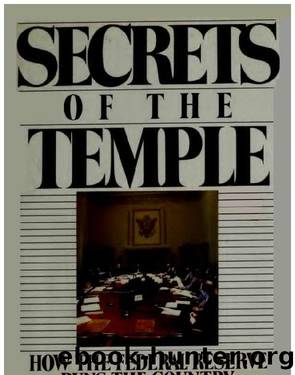Secrets of the temple, how the Federal Reserve runs the country by William Greider

Author:William Greider [Greider, William]
Language: eng
Format: epub
Tags: http://archive.org/details/secretsoftemple000grei
Published: 0101-01-01T00:00:00+00:00
Volckerâs sensibilities nearly always shaped the final decision. âVolcker didnât decide to take away the punch bowl just as the party was getting good,â one of his aides joked. âHe came in and hit it with a hammer.â
Earlier in the spring of 1981, the French ambassador called on Anthony Solomon, president of the New York Fed, and asked him what his outlook was for the American economy. The new government of Frangois Mitterrand was taking power in Paris and Franceâs economic policy would necessarily be influenced by what direction the United States, the locomotive of the worldâs economy, intended to take.
I told him the U.S. was going into recession [Solomon said]. The French finance minister asked the same question at Treasury and was told that a great boom was ahead in America. I later learned that Mitterrand, at his first Cabinet meeting, announced that his government could pursue an expansionist policy because the U.S. would be booming. He was told that I was predicting a contraction. Mitterrand said, âLetâs go ahead and take the expansionist route because the Treasury has given us irrevocable assurances.â He was warned that it was a gamble. They went ahead anyway and, of course, they got clobbered.
The awkward little secret of the American system was that modern recessions did not flow ineluctably from mysterious natural forces in the business cycle. Recessions were induced by the federal government. In the seven recessions since World War II, the same transaction had preceded each contraction: the Federal Reserveâs decision to force up interest rates to an abnormal level. If it kept them there long enough, the economy would inevitably decline. Given that power equation, it was natural for Tony Solomon to understand what lay ahead for the American economy even if the Secretary of the Treasury did not.
For months, Nancy Teeters had also assumed recession was imminent. So did Governor Charles Partee and Governor Emmett Rice. âNobody wishes to see hardship,â Rice explained. âNobody likes to see people lose their jobs and GNP stop growing. But, sometimes, given developments, itâs inevitable.â
The crucial development, of course, was at the Federal Reserve itself. In broad terms, the governors could argue that they had no choice, given their commitment to curb price inflation. In specific terms, however, it was not price inflation that broke the economic expansion and forced a contraction. It was the high interest rates engineered by the Fed.
âYouâre always going to take a risk of a recession when youâre in this process,â Volcker acknowledged. âItâs always a question of when. If youâre never going to take that risk, youâre not going to do anything and end up with recession anyway.â
This distinction was an important refuge for Fed governors. Yes, they would concede, they put the economy at risk, pushed it toward the cliff. But thatâs not the same as saying they deliberately provoked recession. To people who experienced the consequences, it would seem a distinction without much difference.
For obvious reasons, the Fed never declared their expectations in advance.
Download
This site does not store any files on its server. We only index and link to content provided by other sites. Please contact the content providers to delete copyright contents if any and email us, we'll remove relevant links or contents immediately.
International Integration of the Brazilian Economy by Elias C. Grivoyannis(110660)
The Radium Girls by Kate Moore(12018)
Turbulence by E. J. Noyes(8040)
Nudge - Improving Decisions about Health, Wealth, and Happiness by Thaler Sunstein(7694)
The Black Swan by Nassim Nicholas Taleb(7111)
Rich Dad Poor Dad by Robert T. Kiyosaki(6613)
Pioneering Portfolio Management by David F. Swensen(6289)
Man-made Catastrophes and Risk Information Concealment by Dmitry Chernov & Didier Sornette(6007)
Zero to One by Peter Thiel(5789)
Secrecy World by Jake Bernstein(4742)
Millionaire: The Philanderer, Gambler, and Duelist Who Invented Modern Finance by Janet Gleeson(4469)
The Age of Surveillance Capitalism by Shoshana Zuboff(4279)
Skin in the Game by Nassim Nicholas Taleb(4239)
The Money Culture by Michael Lewis(4198)
Bullshit Jobs by David Graeber(4179)
Skin in the Game: Hidden Asymmetries in Daily Life by Nassim Nicholas Taleb(3993)
The Dhandho Investor by Mohnish Pabrai(3760)
The Wisdom of Finance by Mihir Desai(3735)
Blockchain Basics by Daniel Drescher(3574)
